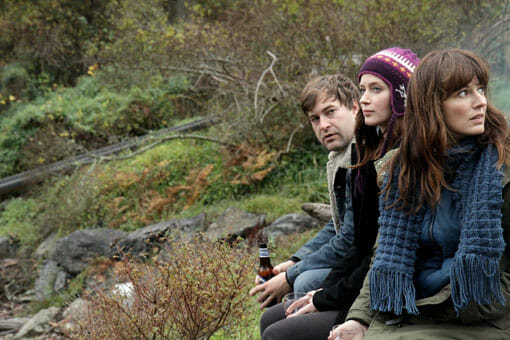Sign up for the
TSL Newsletter
and get $50 off Final Draft 12
By Matt Meier · June 19, 2012

I undoubtedly have a soft spot for films like Your Sister’s Sister and the mumblecore movement as a whole. Where lauded auteurs like Martin Scorsese, Quentin Tarantino, and the Coen brothers construct their masterpieces with the same fastidious diligence with which Mozart composed symphonies, mumblecore is cinema’s jazz: an ensemble of narrative-minded actors and filmmakers uniting with little to no budget and the mere skeleton of a story in order to achieve an uninhibited artistic vision of spontaneous inspiration. It’s easy to romanticize a cinematic approach so distinctly reminiscent of those youthful summers spent with a camcorder and some friends, free to indulge every artistic yearning of adolescence. Such earnestness and honesty form the heart of Your Sister’s Sister, and the dexterity with which the film explores the raw and real emotions of its characters proves a truly moving reminder that, when it comes to storytelling, “limitations” often provide the most liberating source of narrative inspiration.
The film opens with a small gathering of friends acknowledging the one-year anniversary of their friend Tom’s death. Al (Mike Birbiglia) eulogizes Tom with the kind of exaltation we’d expect at such an occasion; but Jack (Mark Duplass), Tom’s brother, swiftly responds to Al’s toast with a bitter reminder of Jack’s more loathsome qualities.
“Remember all of him,” he says. There is no justice in glorifying only the likable qualities of our departed.
In addition to the amusement of watching Tom’s friends squeamishly struggle to tactfully respond to Jack’s indelicate candor, his inebriated and sardonic opening tangent immediately grounds the film within a tone of unflinching honesty and thematic transparency that grows only stronger as the narrative advances.
“We knew that if we didn’t ground this thing emotionally,” Duplass said during the Q&A after the screening, “we were in danger of having a 90-minute episode of Three’s Company.”
Indeed, the plot of Your Sister’s Sister matters far less than the emotional gravity behind its characters and conflicts. Following Jack’s mini-tirade, Iris (Emily Blunt), Jack’s best friend and his dead brother’s former girlfriend, suggests he travel to her father’s lake house in Washington to clear his head for a few days. Turns out that her sister Hannah (Rosemarie Dewitt) had a similar idea for herself as she recovers from the end of a seven-year relationship. So Jack and Hannah move past the awkward disruption of their private retreats the way any two responsible adults would: a night of venting over tequila shots and some quick and clumsy sex. The latter decision proves particularly regrettable when Iris shows up the next day, an arrival further complicated by Iris’ later admission to being in love Jack—yes, as in her dead boyfriend’s brother with whom her sister recently copulated.
As Duplass describes it: “It’s Days of Our Lives with naturalism.”
That distinctly naturalist tonal sincerity that drives Your Sister’s Sister derives almost entirely from its improvised/”unscripted” nature. Like most mumblecore films, Your Sister’s Sister has no screenplay in the traditional sense, but rather 60-page story outline largely consisting of extremely thorough character background. Additionally, aside from the opening scene, the entire film was shot over twelve days at the lake house with only director Lynne Shelton, her three stars, two cameramen, and two or three additional crew members. The cast and crew would work ten to twelve hour days, eat dinner together, then stay up late going over the days work and game-planning for the next days activities.
It’s a uniquely intimate production style, and that intimacy provides a palpable presence within the narrative. The entire film reads like a semi-improvised stage play, featuring extended scenes of dialogue with plenty of long take that allow the emotions of the scene to unfold free of unnecessary cuts. The very nature of this style maintains a unique degree of emotional honesty that allows even the most melodramatic sources of conflict to never feel contrived, nor the most convenient or easy of resolutions from ever feeling insincere or vapid.
“I don’t think plot is inherently cheesy,” Duplass said during the Q&A. “It’s how you deal with it.”
Your Sister’s Sister by no means strives to “re-invent the wheel” of the love-triangle romantic dramedy. I’ve used terms like “emotional honesty” a lot throughout this review because, in all fairness, the film is nothing without it—and conversely, it is a work of beauty because of it. The plot is simple, but the emotions, for those who can relate, strike a visceral chord that cannot be calculated. It is an organic working of the heart, one that can be as forgettable for one as it is moving for another, depending on their preferred proverbial cup of tea. Call it cheesy, perhaps, but never trite. And in the words of Duplass, “I like a little cheese” in my stories.